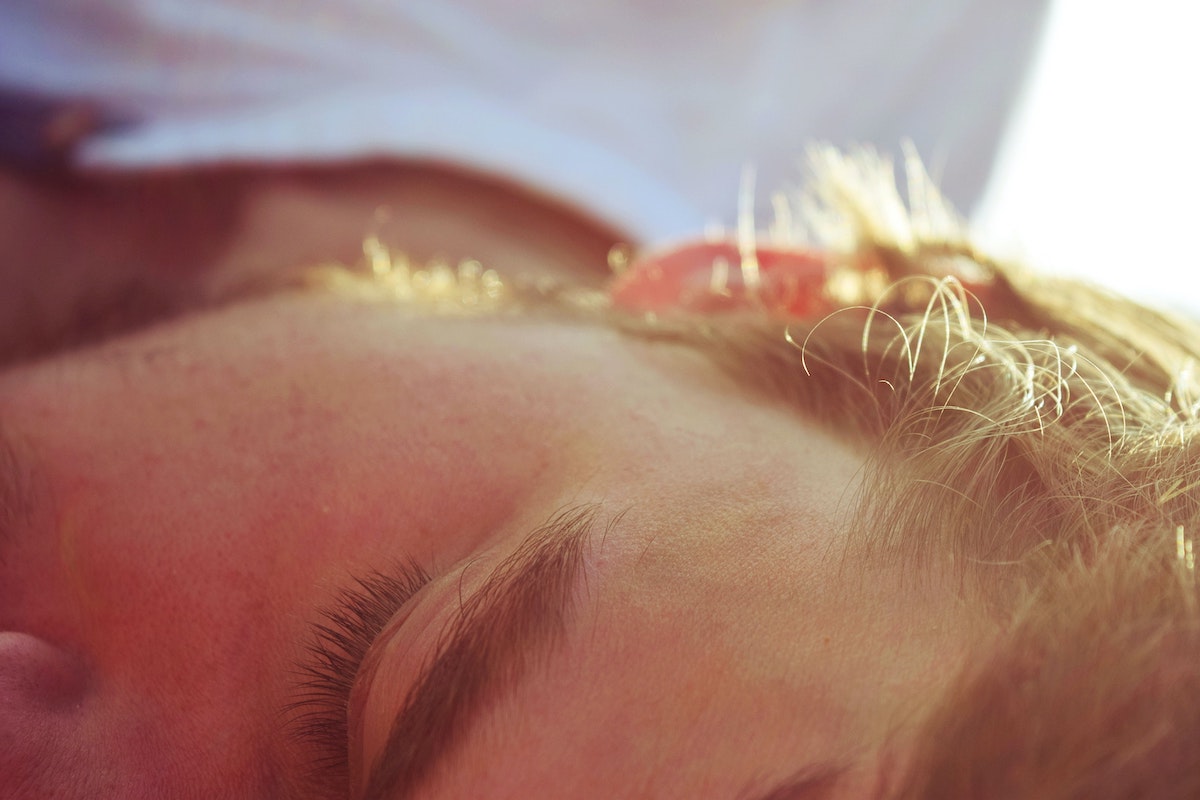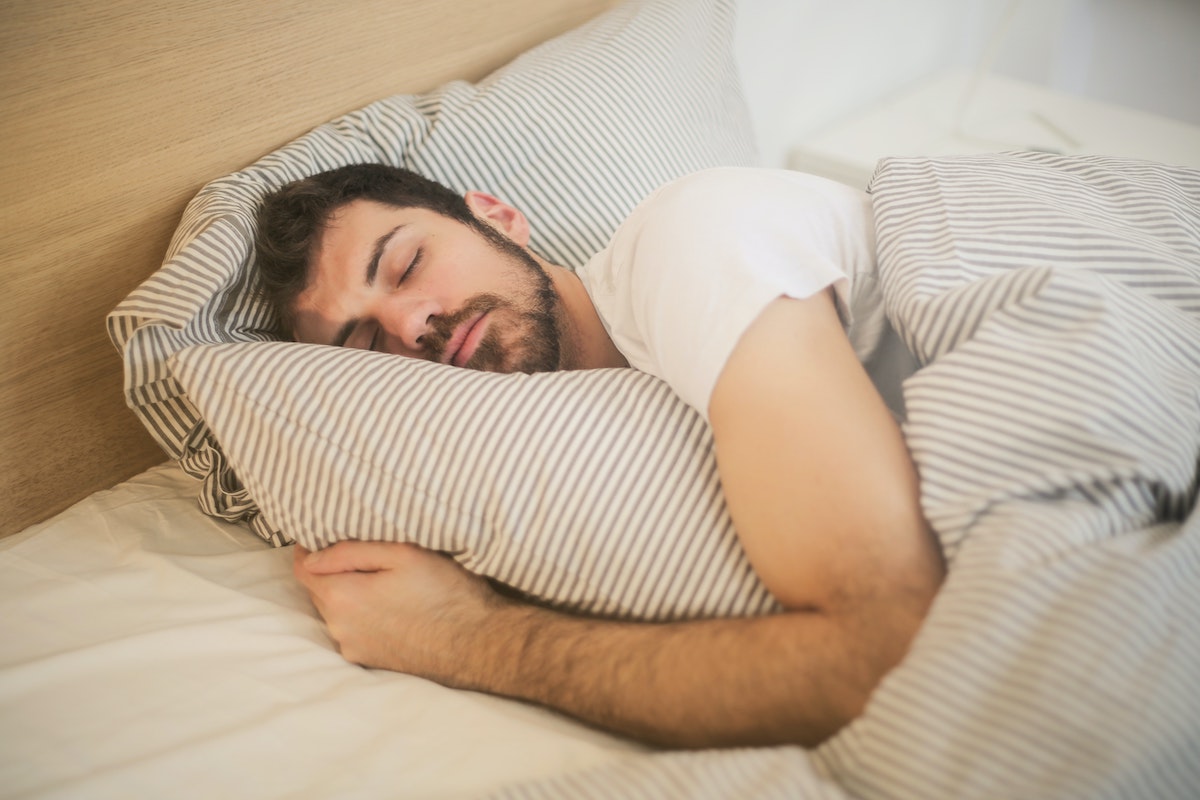Are you a stomach or side sleeper? Brace yourselves. There’s a new rumor floating around on TikTok, and people are losing literal beauty sleep over it.
The latest buzz on the platform is that sleeping positions can change your face shape. TikTok creators — a scientific bunch that they are —are warning folks that sleeping on your stomach and side will change your face structure by causing it to sag.
Twitter gave it a hard pass. However, what do experts think? A 2016 study noted that stomach and side sleepers were more prone to wrinkles and face distortions.
Is it possible that TikTok is on to something? A broken clock is right twice per day, after all. Experts shared their opinions on the rumor and why the best thing you can do for your skin is sleep — period.

Does side-sleeping affect face shapes?
The jury is still out on whether sleeping on your side — or stomach, for that matter — will affect your face shape.
“There is some evidence to suggest that sleeping on your side may affect facial shape over time,” said Dr. Rosmy Barrios, MD, a medical advisor for the Health Reporter.
The idea is that the weight of your head and face cause you to put extra pressure on the skin and tissues.
“Over time, this pressure may cause the skin and soft tissues to stretch, which can contribute to facial asymmetry or changes in facial contours,” Dr. Barrios said.
But experts say the changes aren’t life-threatening, nor does side-sleeping alter bones, such as cheekbones.
“Sleeping on one side will not change one’s bone structure, so it’s a little far-fetched to say that this sleeping style can cause serious changes or deformation,” said Po-Chang Hsu, MD and a medical content expert at SleepingOcean.com.

Do sleep positions matter for skin health?
Experts are less dubious of these claims: Sleep positions can affect the skin.
Some are temporary — you’ll see them in the morning, but they’ll likely fade.
“You might have noticed sleep lines when you wake up, showing how squashed your skin has been during the night,” said Chester Wu, MD, who is double board certified in psychiatry and sleep medicine and serves as a medical reviewer for Rise Science.
However, other changes can happen over time.
“Sleeping on your side may also contribute to the development of wrinkles and fine lines,” Dr. Barrios said. “This is because the constant pressure on the skin can cause it to fold and crease, leading to the formation of lines over time. Additionally, sleeping on your side may cause the skin to become dehydrated.”
There are many reasons for breakouts, including skin type. However, your pillowcase and sleep position may also be to blame.
“Sleeping on your side may also increase your risk of acne, as your pillowcase can absorb oil and dirt and transfer this to your skin,” Dr. Wu said.

I don’t want to change my sleep position. How can I protect my face and skin?
Side sleeping may have drawbacks but has numerous benefits, including back pain relief and reduced risk of sleep apnea and snoring. You may also find it the most comfortable, and you can’t always help how you sleep anyway. Understandably, you may not want to reinvent the wheel (or the way you sleep). Experts share that you can side sleep while protecting your face and skin.
“If you sleep on your side, wash your pillowcase frequently,” Dr. Wu said.
Consider ditching your cotton pillowcase, too.
“If you’re a side sleeper, invest in a silk pillowcase,” Dr. Wu said. “This can reduce the friction and tugging a normal pillowcase causes.”
Ultimately, Dr. Wu stressed that one of the best things anyone can do for their skin is ensuring they are getting enough shut-eye, regardless of their favorite sleeping position.
According to Dr. Wu, not getting ample sleep can up your chances of having:
- Less hydrated skin
- Less skin firmness and elasticity
- More water loss in the skin
- More wrinkles
- More oily skin
When you wake up, a good skin care regimen is critical.
“Practice good skin care routines, such as moisturizing regularly by using products with anti-aging ingredients like retinol, vitamin C, and collagen to prevent wrinkles from forming due to prolonged pressure against the skin while lying down,” said Danielle Kelvas, MD, the chief medical advisor at Sleepline, a website with sleep tips and resources.
Bottom line? Sleep position may affect face shape, but the research is unclear, and even experts are skeptical. Sleeping on your side or stomach can affect the skin, including temporary lines and ones that develop over time and don’t really go away (yes, wrinkles). Sleep positions can also cause you to be more prone to breakouts. Be sure to wash your pillowcase and consider switching to a silk one — it’ll cause less friction. Applying daily moisturizers and considering products with retinol, vitamin C, and collagen can also slow the aging process. However, getting enough sleep is paramount to your skin health (and overall well-being). Regardless of whether you’re a side sleeper or a back sleeper, make sure you’re sleeping.
Editors' Recommendations
- The best toner for men – cleanse your pores with one of these top products
- Did you know you can change face shapes without surgery? Here’s how
- Snail mucin (snail slime) is great for your skin – an expert tells us why
- An expert reveals the 5 best men’s skincare tips for National Men’s Grooming Day
- Does your scalp need sunscreen? Experts weigh in




